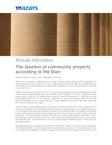
The taxation of community property according to the Dian
The community property, understood as the assets received by each spouse after the liquidation of the marital partnership, is different from the marital portion because the latter "is an additional value received by one of the spouses to guarantee his/her subsistence, in view of his/her situation of poverty or low income" [1].
Since the enactment of Law 20 of 1979 (Art. 6, numeral 4, paragraph 5) it was established that "What is received as marital property does not constitute occasional profit, but what is received as marital portion does". When the Tax Statute was issued, by means of Decree 624 of 1989, this rule was incorporated in article 47 of such regulatory body, which is found in the section called "Income that does not constitute income or occasional gain". Today, despite 15 tax reforms have been approved, this rule has remained unchanged.
The Dian, when initially interpreting this rule, issued Concept 28286 of 2001 in which it stated that "at the time of liquidation of the marital partnership, the community property is not susceptible to produce a net increase of the patrimony because it was part of the patrimony itself. The asset or the property subject of the community property was capitalized at the time (sic), that is to say, as the income was generated". This interpretation is correct, since the income was already taxed in the head of one or both spouses, and the fact that one of them renounced to community property and such renunciation benefited the other, cannot generate a new tax, under penalty of double taxation for the same tax generating event.
Notwithstanding this, by means of Official Letter 250-006184 of March 12, 2019, the Dian established that "when the waiver of community property is understood as a donation or in its absence as an inter vivos legal act of disposition of goods or rights for free, the income received by the donee or the beneficiary party of the act celebrated is considered as occasional gain in accordance with article 302 of the Tax Statute and is taxed with the occasional gain tax".
This position of the Dian is incorrect and must be revoked. In the first place, the Dian cannot, through a concept, pretend to revoke (or to generate a loss of validity) a rule that is clear and imperative. If the law establishes that "what is received by way of community property does not constitute occasional gain", it is wrong for the tax administration to indicate that "the income received by the donee or the beneficiary party of the act (by virtue of the waiver of community property) is considered occasional gain". Suffice it to recall here the general principle of law according to which "where the law does not distinguish, it is not given to the interpreter to do so".
The interpretative power of the Dian must be exercised under the strictest canons of legality, and not for the purpose of defrauding mandatory rules, since this, in addition to constituting a prohibition for public officials (art. 39 numeral 33 of law 1952 of 2019) goes against the principle of responsibility established in numeral 7 of article 3 of law 1437 of 2011, according to which the authorities and their agents will assume the consequences for the excess of functions in which they incur.
[1] https://gerencie.com/diferencia-entre-gananciales-y-porción-conyugal.html


